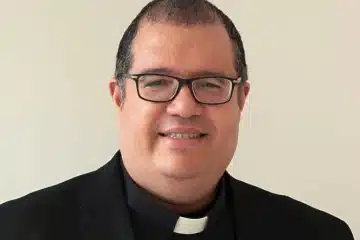Keeping the Body with Holiness and Reverence: Part 2
Note: This article is part of an ongoing series on Pope St. John Paul II’s “Theology of the Body” (TOB).
We have seen in previous articles that purity of heart is necessary if we are to fulfill the commandment “thou shall not commit adultery.” This purity requires conversion of heart aided by the gift of the Holy Spirit. Basing his writings on St. Paul’s teaching, Pope St. John Paul II saw two dimensions to this purity: “abstaining from unchastity” and “keeping one’s body with holiness and reverence” (cf. 1 Thess. 4:3-5).
Father John Hardon’s Modern Catholic Dictionary defines reverence as “the virtue that inclines a person to show honor and respect for persons who possess some dignity.” It goes on to distinguish reverence for parents and elders in the family, for civil authorities, for Church authorities and, lastly, “religious reverence toward any person, place, or object related to God.”
Unfortunately, we live in a very irreverent time in history. Indeed, nothing is regarded as sacred in contemporary society. The very idea of sacredness is often scorned or even attacked. As John Paul II said in his encyclical letter Evangelium vitae, modern man “no longer considers life as a splendid gift of God, something ‘sacred’ entrusted to his responsibility and thus also to his loving care and ‘veneration.’ Life itself becomes a mere ‘thing,’ which man claims as his exclusive property, completely subject to his control and manipulation” (EV, 22). Is it any surprise then that our culture has almost completely lost touch with the value of marriage and continually degrades sexuality to lower and lower levels? According to TOB, we must recover a sense of the sacred and cultivate the virtue of reverence to be capable of true spousal love. Without these, we will continually fall into using each other as objects for sexual gratification and remain slaves to our passions.
Reflecting on the nature of reverence and its connection to sexuality, John Paul II emphasized St. Paul’s teaching that, for Christians, our bodies have become part of Christ’s body and temples of the Holy Spirit (1 Cor. 6:15). Therefore, the human body deserves reverence just like holy places, such as churches
and shrines, and objects used in sacred liturgy, like the chalice or tabernacle. This reverence extends, of course, not only to our own bodies but to those of others. We are called to see in others’ bodies not only a person made in the image of God but also (at least potentially) a chosen dwelling place of the Almighty. Furthermore, the link between our sexuality and the power to co-create with God new human life should inspire such awe and wonder in us that every form of sexual debasement horrifies us to the core.
Clearly, as fallen human beings our hearts and moral sentiments need continual conversion to achieve this reverence. We can rejoice in the fact that our Savior does not leave us without sufficient means for our sanctification. He has poured the Holy Spirit into our hearts and given us the Church to guide us with Her teaching and strengthen us through the sacraments. In particular, John Paul II linked our call to reverence with the gift of piety, which is listed as one of the gifts of the Holy Spirit (see Is. 11:2-3; CCC, 1831).
The Spirit’s gift of piety moves us from within, to help us cultivate awe and reverence toward all that is good and holy. It strengthens our purity of heart and firm resolve never to abuse our bodies or others’ bodies for sexual gratification. It aids our consciousness of the spousal meaning of the body and the need to always place the good of the person and demands of spousal love above our selfish desires. As John Paul II said, purity of heart, “allied with the gift of piety as a fruit of the Holy Spirit’s dwelling in the ‘temple’ of the body, causes in the body such a fullness of dignity in interpersonal relations that God himself is thereby glorified” (TOB, 57.3). Let us then fervently implore the Holy Spirit for a new outpouring of the gift of piety in each of our hearts and work together to cultivate awe and reverence toward all that is holy, including our bodies.
 Dr. Andrew Sodergren MTS, PSY.D is a Catholic psychologist and director of psychological services for Ruah Woods. He speaks on the integration of psychology and the Catholic faith. He and his wife, Ellie, have five children.
Dr. Andrew Sodergren MTS, PSY.D is a Catholic psychologist and director of psychological services for Ruah Woods. He speaks on the integration of psychology and the Catholic faith. He and his wife, Ellie, have five children.
This article appeared in the August 2024 edition of The Catholic Telegraph Magazine. For your complimentary subscription, click here.













